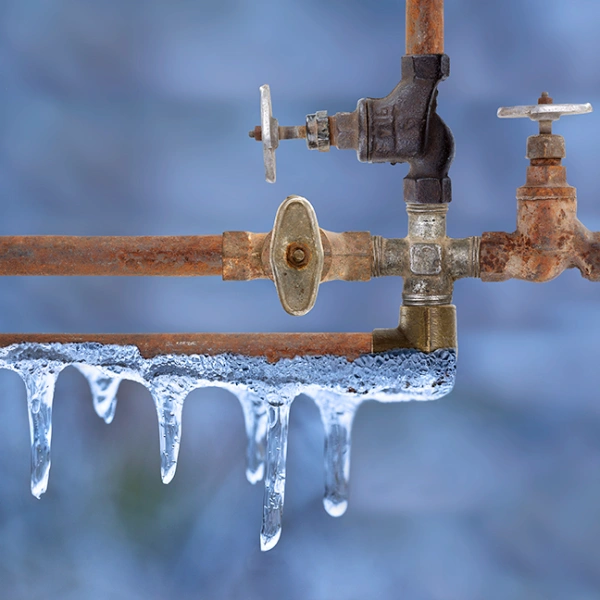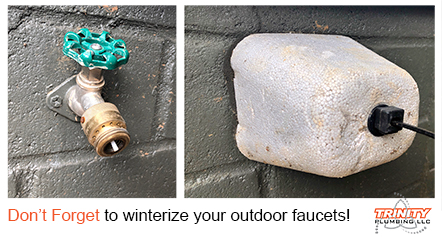
Winter can be hard on plumbing – especially when temperatures drop below freezing. Even though winters are milder in Georgia than in most other parts of the US, we still experience cold snaps and the occasional deep freeze. Don’t be caught off guard – frozen water and sewer pipes are not only inconvenient, they can be costly.
How can you protect pipes from freezing?
As temperatures plummet, chances increase that pipes can freeze. Thankfully you can lower the risk of your pipes freezing by taking precautions to winterize your plumbing.
9 Ways to Protect Your Plumbing in Winter:
- open your kitchen and bathroom cabinets that have pipes – the warm air from the room will help keep pipes from freezing (Caution: if you have children or pets – REMOVE any dangerous items and place them out of reach)
- disconnect garden hoses from all outdoor spigots
- protect outside spigots by closing the cut-off valve and draining the faucet, cover faucet with foam insulation if there is no cut-off valve
- drain water from lines that are prone to freezing – like supply lines to swimming pools and sprinklers
- insulate vulnerable areas – such as attics, basements, and crawlspaces
- insulate around crawl space doors and close vents
- garage doors should be kept closed
- don’t let thermostat get below 55 degrees Fahrenheit
- open faucets to allow a trickle of running water on the coldest nights- moving water takes longer to freeze than standing water
Note: Insulation slows the transfer of heat, but it doesn’t prevent pipes from freezing.
Know the location of your water main and how to shut it off. It’s like learning to change a tire – hope you never have to do it, but glad you know how when the time comes.
Trinity Plumbing Pro Tip
During your annual plumbing inspection & maintenance, ask your plumber to insulate any vulnerable pipes. If there are areas of pipe that freeze regularly, your plumber can reroute lines to help prevent refreezing. Want to take precautionary measures before winter hits? Call us to schedule an inspection.
Trinity Plumbing Pro Tip
8 Frequently Asked Questions About Frozen Pipes:
How do you know if pipes are frozen?
Pipes can freeze during cold spells, so keep in mind these warning signs:
- You turn on the faucet but there’s no running water or just a slight trickle. You might have a frozen water pipe.
- There’s a strong sewer smell in your home. Your water or sewer line may be frozen.
How do you find an indoor frozen water pipe?
To locate frozen pipes, one at a time turn on each faucet. If there’s only a slight trickle of water, or no water comes out at all, it’s possible the water inside the pipe has frozen. Normally, the pipe that’s frozen is located nearest to the faucet that’s not working.
Also, do inspection of any visible pipes – basement, crawlspace, attic, garage, under sinks, exterior faucets, pool pumps.
- Are any pipes covered in an icy residue or condensation?
- Are any pipes cracked? Pipes can crack or burst due to the expansion of freezing water.
(Keep in mind that frozen pipes might not be visible or easily accessible.)
What to do if your pipes are frozen?
When your pipes are frozen, immediately turn off the main water supply! This may help to prevent flooding if the pipe ruptures.
Next, you may attempt to thaw the frozen pipes yourself if you’re experienced with home maintenance. Be careful as this can be dangerous if not done correctly. Water expands when frozen, which can wreak havoc on pipes and fittings. So be prepared for what might happen after the pipe thaws – most property damage occurs after the pipe is no longer frozen.
If you can’t locate or access the frozen area (or prefer to leave it to a pro), contact a professional plumber.
How to thaw a frozen pipe?
Here are some tips for thawing your frozen pipes:
- Open the faucets – During the thawing process, steam is created and will need to vent out of the pipe. As the ice melts, the open faucet also allows water movement which helps speed up the thawing process.
- Apply heat – wrap frozen section with heating pad or hot towel. Continually apply heat until water flow returns to normal.
- DO NOT use a blow torch, kerosene heater, propane heater, or any other open flame to thaw your pipes. It will damage your plumbing and could start a fire.
- Once pipe is thawed, immediately check for leaks. Also, for several days afterwards, be on the lookout for leaks from hairline cracks or loosened fittings.
What pipes are likely to freeze?
All pipes can freeze, though we commonly see frozen pipe in these locations:
- garages
- crawlspaces
- unheated basements
- pipes in exterior walls
- outside hose connections
- swimming pool pumps and supply lines
- sprinkler systems
Will frozen pipes thaw on their own?
Never ignore a frozen pipe! While ice thaws eventually, it’s best to take immediate steps to thaw your pipes.
Why do frozen pipes break?
As water freezes, it expands. The expanding force can cause destruction, causing pipes to crack or burst. While some pipes are more flexible than others, they all have a breaking point. And a burst pipe can cause thousands of dollars in damage in just a few minutes.
Note: Check out this freeze test on several water pipes.
What if your plumbing pipe bursts?
If your pipe freezes and bursts, you need to act fast to minimize further damage.
- Immediately turn off main water supply.
- Turn off water heater.
- Call your plumber.
- Move any belongings away from the water.
- Remove excess water. Water can ruin drywall, flooring, and cause mold to develop. Quickly get rid of standing water – turn on fans and mop up water. If there’s a lot of water, it may be quicker to use a wet/dry vacuum.
- Turn on a dehumidifier. Pulling moisture out of the air can reduce risk of mold.
If there is considerable damage, a water restoration company can help you remove excess water and repair damaged walls & floor.

Trinity Plumbing – Emergency Service & Support
Fingers crossed that we have a mild winter here in Georgia. But if temperatures drop below freezing and winter is hard on your pipes, don’t be overwhelmed.







